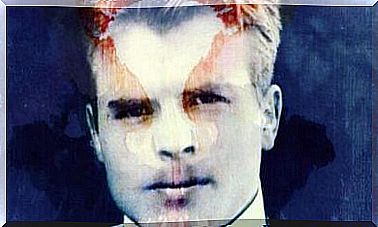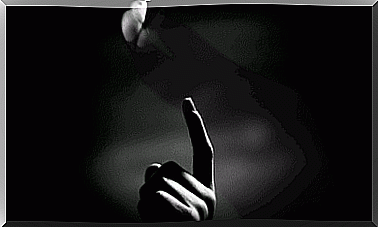Emotional Withdrawal: When A Breakup Leads To Obsession

After a breakup, there is emotional withdrawal. Because ending a love relationship is not easy. It brings psychological suffering. And that’s really destructive to our brains.
The process is actually very similar to what addicts go through during withdrawal. It’s a form of neurochemical chaos. And it will take us a lot of time and difficult periods to get out.
Almost everyone experiences what it feels like at some point. Teens discover this feeling when they experience their first breakup, the pain of distance or the disappointment of rejection.
Adults also have this experience. When it happens, it feels like life is suddenly meaningless. Love ends or one partner cheats on the other. Or we may even have to end a relationship that has no future. Or we have to end a relationship that is too painful.
Letting go of someone we still love hurts. We have to get used to his absence, accept that it is over and rebuild our lives without that person.
Most of us are not prepared for this situation. But we do it anyway. And in doing this we gain inner strength.
But the real problem arises when we get into an obsessive spiral, into a vicious circle, instead of turning the page.
You will notice that this is a kind of dependency. Because emotional withdrawal puts this type of people in a state of complete vulnerability and extreme suffering.
Emotional withdrawal or the inability to say goodbye
Carlos is thirty years old. It has now been seven months since his girlfriend left him. He met Paula in high school when they were both sixteen years old. Together they went to university and eventually they started a company together.
The last few years have undoubtedly been tough. They were in debt and the business was not a success. Paula fell into a depression because of the stalled project. Eventually, this started to affect their relationship.
Carlos insisted on moving on. Yet she left him in the end. She explained to him in a clear and sincere way why she wouldn’t give him a second chance. That was when their relationship ended.
But even though she has explained it to him, Carlos keeps trying to see her. He checks her social media every day and thinks of ways to run into her by chance.
Carlos isn’t just obsessed with reviving their relationship. Even today he is unable to work or do anything. His emotional withdrawal is so intense that he is a shadow of himself. He has become dependent on affection and is trapped in a cycle of anxiety and depression.
Now let’s look at some more characteristics associated with this type of person.
The Five Signs of Emotional Withdrawal
We must be clear about one thing. When we end a relationship, we are usually all prone to experiencing emotional withdrawal. But this is only one part of the pain.
This chapter in our lives should motivate us to use intelligent and useful confrontation strategies. Because we need to use tools to soften our path and deal with the breakup in a mature way.
- But this psychological condition where people get stuck and suffer constantly is common in individuals with low self-esteem. This also applies to people who are emotionally very dependent on their partner.
- A second characteristic of emotional withdrawal is that a person is not convinced that the relationship is over.
- Anxiety and obsessive behavior are other signals. They are unable to maintain ‘zero contact’. They will always find an excuse to call or bump into the other person.
- Another, and no less important, characteristic is that dependent people cannot cope with the emotional pain. They don’t have the skills to handle it. Because they feel paralyzed and respond to the suffering by looking for more opportunities.
- Finally, we should also not forget all the complex, intense and debilitating symptoms that clearly affect the health of that person. There is insomnia, loss of appetite, difficulty concentrating, lack of interest in life, depression…
How do we deal with emotional withdrawal?
Carlos, the broken-hearted man in our example, shows all the psychological and behavioral signs of emotional withdrawal. What he needs in this case is the help of an expert and the right form of psychological therapy.
No one deserves to live in such a defenseless condition. No one should lose love for themselves to the extent that they become trapped in existential futility and in an intensely destructive state of emotional suffering.
We may be in the same situation as Carlos right now. Or maybe we’re in the middle of a breakup that we’re learning to deal with. In either case, it is good to think about the following strategies. Because they are fundamental things that we should always keep in mind.
These are some crucial aspects
- Emotional withdrawal is completely normal when the intensity and length do not exceed certain limits. We must assume that it will pass. After all, it is a state that should end and give way to a more balanced, centered and stable mood.
- We have to accept our negative emotions. This is true of all feelings: sadness, heartache, pain. They are all moods that sooner or later turn into acceptance and victory.
- In these cases it is essential to have no contact at all. It is imperative that our ex-partner is not on social media or in our contact list. This is the first step with which we detach ourselves from his life. Plus, it will avoid getting us into the wrong kind of dynamic.
- Making changes in your life pays off. Make new friends or find new hobbies. These are simple things that are a great help. Because that way we can “liberate our minds” and break the cycle of our obsession.
As we go through this process, we must not forget some important aspects. Pay attention to your self-image, your dignity, your values and your goals. We should never consider a breakup as the end of the world.
On the contrary, we should see it as the end of a chapter. It’s a necessary start that definitely means some good things to us. A new, stronger and even more beautiful version of ourselves.









